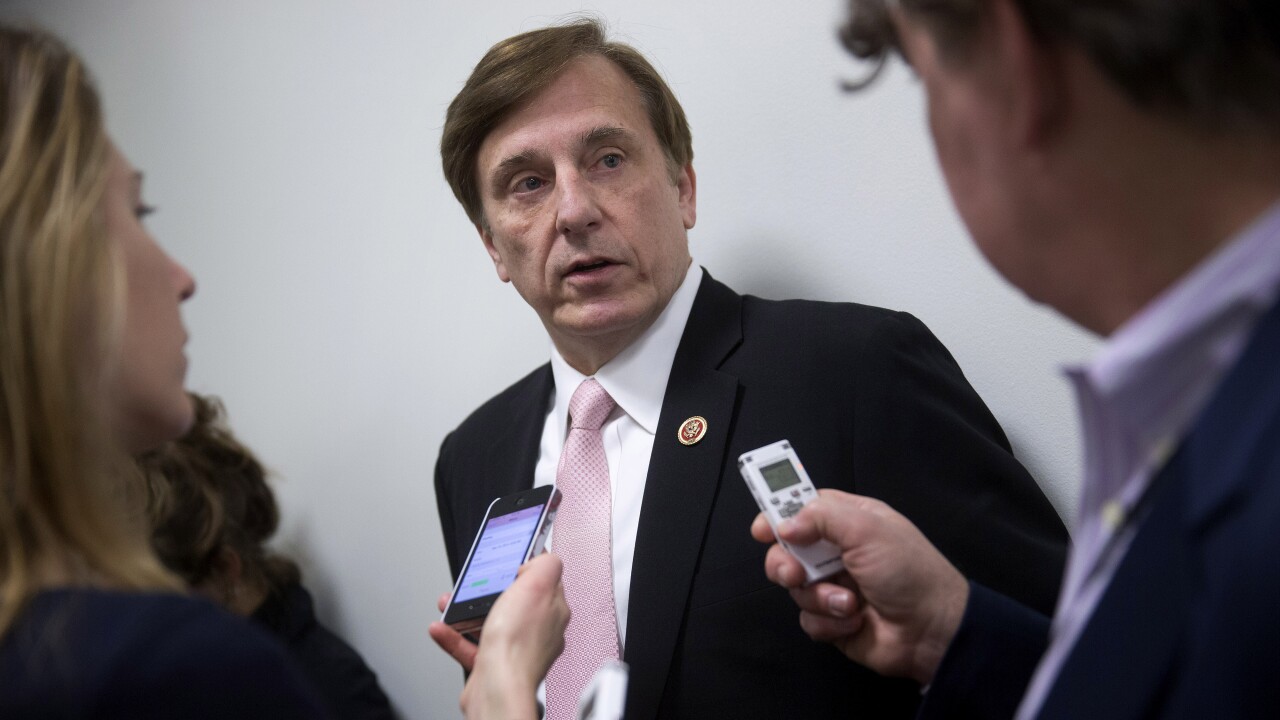Illinois Gov. J.B. Pritzker laid out two budget scenarios for fiscal 2021 with the fate of $1.4 billion of proposed spending tied to passage of a constitutional amendment allowing the state to move to a graduated income tax structure from the current flat one.
The proposed
The lack of any material action to address the state’s $137 billion pension tab and $7 billion bill backlog will disappoint market participants looking for the state to tackle its most burdensome fiscal pressures before an economic downturn hits. A proposal or recommendations are expected "soon" on potential state asset sales or transfers to benefit the pension system, an administration official said. The scope and impact remains uncertain.
Some of the proposed spending hinges on whether voters approve the amendment on the November ballot. The proposed tax structure Pritzker backed and the Democratic majority legislature approved last year would raise rates on the top 3% of earners. If voters sign off, the tax change would generate about $1.4 billion in fiscal 2021 and $3.6 billion in fiscal 2022 and going forward.
“To address the uncertainty in our revenues, this budget responsibly holds roughly $1.4 billion in reserve until we know the outcome in November,” Pritzker said in his budget address Wednesday. “We cannot responsibly spend for these priorities until we know with certainty what the state’s revenue picture will be.”

The $1.4 billion of spending that would set aside and cancelled if the amendment fails includes $308 million for education; $480 million for a Medicaid provider payment increase, the state’s employee group health insurance contribution and Department of Aging community care program increase; and $600 million for state and local government initiatives.
That $600 million figure includes $73 million or 5% of income tax revenue to be shared with local governments and $25 million or 5% of sales tax revenue that is to be shared with local governments. The state also would forgo the additional $100 million pension contribution and a $50 million deposit into the rainy day fund.
The budget would be balanced on a cash basis without the graduated income tax revenue, Pritzker said.
Budget documents warn that if the graduated income tax does not take effect “and no other additional revenues are realized, then estimated revenues for FY2021 will decline by $1.4 billion, certain appropriations will not take effect, and other transfers and borrowings will be used to maintain a balanced state budget.”
Top budget officials said the budget doesn’t rely on one-time revenues that add to structural woes. An estimated $108 million ending balance would go to pay down the backlog.
DETAILS
The state plans no new borrowing programs or special issuance beyond the previously approved $1 billion in bonding authority — of which $700 million remains unused — to pay for an ongoing pension buyout plan and $1.2 billion to pay down the backlog.
The state expects to issue $2.1 billion of general obligation bonds and $250 million of sales-tax backed Build Illinois bonds in fiscal 2021. The new-money debt would fund projects in the fiscal 2021 $3.6 billion capital program that’s part of the $45 billion multi-year Build Illinois infrastructure program.
No pension obligation bond issuance is proposed. Last year, the budget drew negative reviews for a proposal to push out the pension funding schedule and issue several billion of POBs.
A state task force on asset sales and transfer to benefit the pension system is expected “soon,” administration officials said. The long-awaited recommendations are taking time to craft as the state needs to set up a proper valuation system and legal structure to transfer that value, officials said.
The $42.1 billion general fund spending is part of a larger $84.5 billion all-funds budget and is up from the $40.6 billion fiscal 2020 general fund budget.
Revenues are projected to rise a modest 1.6% to $40.7 billion from $40 billion before any additional income tax revenue is counted should the graduated income tax structure take effect midway through the fiscal year.
Individual income tax revenue — absent the graduated income tax structure — is projected to grow by 3.6% while corporate collections holds steady and sales tax are estimated to grow by 3.4%
The budget incorporates $225 million in savings from reduced employee healthcare costs, interest, consolidations, and other management efficiencies announced last year.
The budget puts $50 million toward the state’s near empty rainy day fund and under legislation proposed by state Comptroller Susana Mendoza and Sen. Heather Steans, D-Chicago, annual contributions would be made. The deposit depends, however, on passage of the graduated income tax. The fund held $3.6 million at the end of fiscal 2019. The current fiscal 2020 budget calls for a $50 million deposit.
The budget relies on $46 million in projected general fund revenue from recreational cannabis sales that became legal January 1.
Kindergarten through 12th grade funding would receive the $350 million increase pledged — but not formally required — under revised formulas approved in 2017, but $150 million would be set aside and freed up only if the gradated income tax passes. A withholding of the full amount would deliver a blow to fiscally struggling districts like Chicago Public Schools.
Public higher education, hit hard during the budget impasse when many universities lost their investment grade ratings, would see a 5% operating aid increase totaling $55.6 million but it’s tied to the graduate income tax amendment. If the ballot measure fails, aid levels would be held steady. The same holds for a proposed 5% increase of $14.9 million in community college operating grants.
Pritzker used the speech to highlight his first-year gains, the need for reinvestment, and road ahead that largely rests on voter approval of the graduated income tax.
“We’ve taken enormous strides forward to undo years of financial mismanagement,” Pritzker said. Late payment penalties on the bill backlog are down to $100 from $950 when the backlog hit its high in 2017 and year-over-calendar year the backlog dropped by nearly $1 billion.
Pritzker pointed to more recent rating agency commentaries that acknowledge a more stable fiscal environment after eight downgrades between 2015 and 2017. Analysts’ commentaries have described that stability, however, as near-term because pensions, the backlog, and rising budgetary costs loom large over the long term.
The state’s ratings don’t hinge on new revenue from the graduated tax but analysts have told the state that any new revenue is best used to pay down pensions and structurally balance the budget.
The state’s yield penalties, as reflected in spreads, have materially narrowed over the last year, but that’s due to a combination of the state’s near-term budget and rating stability and to record-low municipal rates that have driven up demand for the higher-yielding paper Illinois offers.
The state’s 10-year general obligation bond was trading at a 183 basis point spread to Municipal Market Data’s top benchmark last year at this time. The 10-year is now at a 132 basis point spread to MMD.
Trades last week showed the state cracked the 100 basis point spread mark, said IHS Markit strategist Ed Lee. An 11-year bond traded at an 86 basis point spread and a nine-year bond traded at an 85 basis point spread.
Pritzker, who ended Bruce Rauner’s one-term tenure that was marked with political acrimony that left the state’s ratings on the verge of junk status, won some limited GOP support for his 2020 budget and a $45 billion capital plan and gambling expansion passed in bipartisan votes.
The state’s political and near-term budget stability helped hold the state’s ratings intact and prompted Fitch Ratings to shift its outlook to stable from negative, but investors and rating agencies were critical of the 2020 budget for doing little to address pensions and the backlog.
Some have suggested the state pursue a constitutional amendment to alter the state constitution’s pension clause that protects bars impairing or diminishing pension benefits. Pritzker has long said the benefits are a promise and he made his position clear again Wednesday.
“The fantasy of a constitutional amendment to cut retirees’ benefits is just that — a fantasy. The idea that all of this can be fixed with a single silver bullet ignores the protracted legal battle that will ultimately run headlong into the Contracts Clause of the U.S. Constitution,” Pritzker said.
“Without breaking our promises, we must relentlessly pursue pension initiatives that reduce the burden on taxpayers,” Pritzker said, but he did not offer new proposals beyond existing measures underway or previously proposed.





